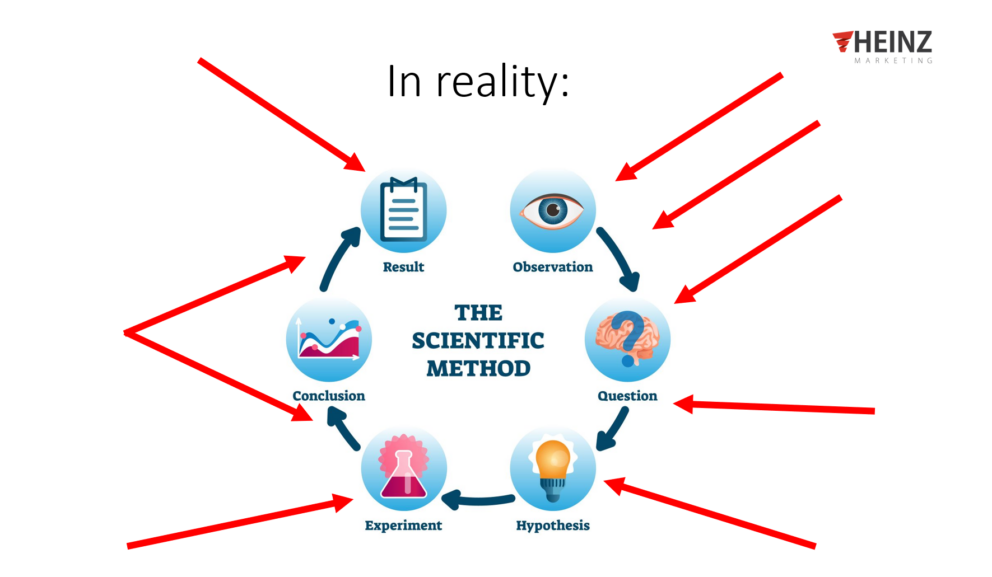Bridging the Gap: The Crucial Role of Sales Insights in Enhancing B2B Marketing Messaging

Summary
Here are 4 key reasons why B2B marketers shouldn't overlook sales input when crafting effective messaging.
By Win Salyards, Senior Marketing Consultant at Heinz Marketing
In the fast-paced world of B2B marketing, effective communication is critical to winning over potential clients and nurturing existing relationships. While marketing teams are often tasked with crafting compelling messages to reach their target audience, there’s a valuable resource they sometimes overlook – their sales counterparts. Sales teams are on the front lines, engaging directly with customers and gaining invaluable insights into what resonates with them. Suppose marketing needs help communicating the value of a high-value yet difficult-to-message product. In that case, their counterparts on the sales side may have already figured out an excellent way to get that value across to prospects. Because sales teams are often overlooked when it comes to weighing in on areas often seen as core to marketing, here are four key reasons B2B marketers should seek out the input of their sales counterparts.
Understanding the Customer Journey
Sales teams deeply understand the customer journey because they interact with prospects and clients throughout every stage. They are well-versed in the pain points, objections, and motivations influencing a buyer’s decision-making process. By tapping into this knowledge, marketing teams can tailor their messaging to align with the customer’s needs and concerns at each journey stage.
For instance, when salespeople share feedback on common objections, marketing can proactively address these objections in their content or adjust their messaging to resolve concerns preemptively. This alignment ensures marketing materials are more relevant and compelling, ultimately increasing their effectiveness.
Fine-Tuning the Value Proposition
Sales teams are uniquely positioned to provide real-world feedback on the effectiveness of a company’s value proposition. They can pinpoint which product or service aspects resonate most with customers and which may need further refinement. This insight helps marketing teams refine their messaging and focus on the elements that drive the most value for clients.
By collaborating closely with sales, marketing can continuously fine-tune the value proposition, ensuring it remains compelling and relevant as market dynamics evolve. This iterative process leads to more effective messaging that speaks directly to customer needs and differentiates the business from competitors.
Crafting Customer-Centric Content
Content marketing is a cornerstone of B2B marketing strategies, and the content must resonate with the target audience. Sales teams can provide firsthand accounts of customers’ questions and challenges, enabling marketing to create content that directly addresses these issues.
Whether it’s blog posts, case studies, or whitepapers, involving sales in the content creation process can help ensure that it’s customer-centric and genuinely valuable. This collaboration also fosters a stronger sense of teamwork between marketing and sales, leading to more effective communication overall.
Navigating Industry Jargon and Trends
Industries constantly evolve, and keeping up with the latest trends and terminology is essential to remain competitive. During customer conversations, salespeople often encounter new buzzwords, industry trends, and emerging challenges. By regularly consulting with sales, marketing can stay ahead of the curve and incorporate these insights into their messaging strategy.
Marketing teams that tap into the knowledge of their sales counterparts can adapt their messaging to reflect industry-specific language and trends, demonstrating their expertise and credibility to potential clients.
In B2B marketing, collaboration between marketing and sales is crucial for success. Seeking messaging advice from sales teams can help marketing create content and campaigns that resonate with the target audience, fine-tune the value proposition, and stay ahead of industry trends. By working together, marketing and sales can foster a culture of continuous improvement and customer-centricity that drives business growth and builds lasting relationships with clients.






